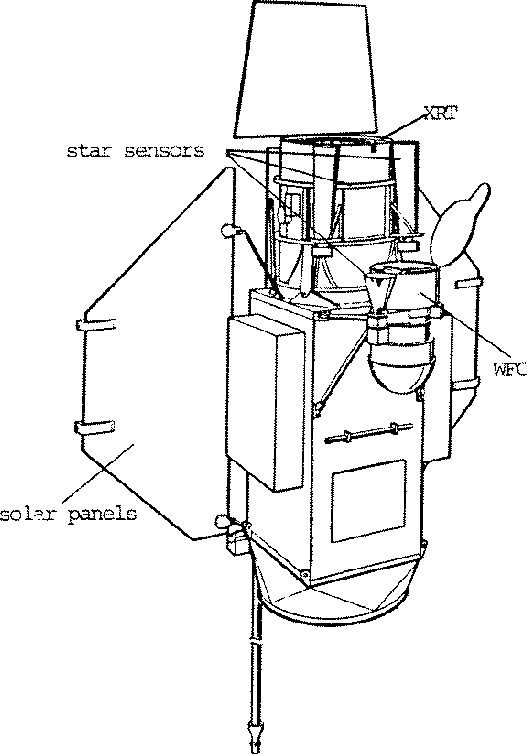




Next: Command and Data Handling
Up: 1.2 Payload Description
Previous: 1.2 Payload Description
ROSAT is a three-axis stabilized satellite with a total mass
of 2.429 tonnes. The telescope assembly is  4 m in length.
The scientific payload consists of:
4 m in length.
The scientific payload consists of:
- The X-ray telescope (XRT)
- with its 2.40m focal-length
mirror assembly consisting of four nested Wolter-I mirrors.
The focal plane instrumentation consists of a carousel on which
there are two position-sensitive proportional counters (PSPCs),
each with a filter wheel carrying a boron filter,
and a high-resolution imager (HRI) (for details see
Chap. 2, 3,
4, and 5).
- The wide-field camera (WFC)
-
with its 0.525m focal-length mirror assembly consisting of
three nested Wolter-Schwarzschild mirrors (co-aligned with the XRT).
The focal plane instrumentation consists of a curved microchannel plate
(MCP) a carousel containing 8 filters, of which 6 are science
filters (for details see
Chap. 6).
The rest of the payload includes:
- The on-board computer (OBC) and the command and data handling system
(CDHS)
-
- The attitude measuring and control system (AMCS)
- including:
- two star trackers (STC-1 and STC-2)
used for optical position sensing and attitude
determination (Sect. 1.2.5).
An additional star tracker (WFC STC) provides the WFC with
independent attitude determination,
however this sensor is not (at present) used for spacecraft control.
- four gyros and three reaction wheels used for attitude control
(Sect. 1.2.3)
- a sun sensor (Sect. 1.2.7)
- a magnetometer (Sect. 1.2.8)
- Two South Atlantic Anomaly detectors (SAAD-1 and SAAD-2)
-
used to safe-guard the health of the focal plane instruments during
passage through the South Atlantic Anomaly (SAA) and
particle belts (Sect. 1.2.6)
Power is supplied through three solar panels
providing 1kW of power during sunlit parts of the orbit,
and through a rechargeable battery during the shadow phase
(S/C night, up to 40 minutes per orbit).

Figure 1.1:
Schematic view of the ROSAT spacecraft.
[ROSAT AO-21991].
A schematic view of the ROSAT spacecraft is shown in
Figure 1.1.





Next: Command and Data Handling
Up: 1.2 Payload Description
Previous: 1.2 Payload Description
If you have problems/suggestions please send mail to
rosat_svc@mpe-garching.mpg.de
![]() 4 m in length.
The scientific payload consists of:
4 m in length.
The scientific payload consists of:
